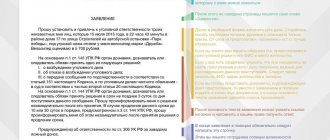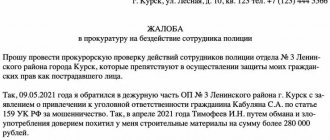In accordance with the provisions of Art. 142 of the Code of Criminal Procedure of the Russian Federation, this term means voluntary confession of committing a crime. An appearance is considered to be a message only from the person who committed the act and admits to it.
A communication that relates to the participation in the criminal activities of others is not considered an appearance, it will simply be a statement, for example:
Ya. Ivanov Ivan Ivanovich, I voluntarily inform you that Nikonov Vladimir Nikolaevich, living at the address st. Krasnaya, 3, apt. 4, stole from the “Products” store, located in building 3 on the street. Red, food products totaling more than 20,000 rubles. Vladimir Nikolaevich Nikonov told me about this.
From this statement it is clear that Ivanov is talking about the crime committed by another person. Such a statement is not a confession, because it concerns another person. Of course, the police officers will take the information received into account, interview the store director, etc., after which the issue of initiating a criminal case or refusing to initiate it will be decided.
See also: Form of statistical arrival sheet in form 12P in 2021
As with filing a statement, turning yourself in is grounds for initiating a criminal case. To do this, the district police officer or investigator has a period of 3-10 days to issue a resolution, which will indicate the name of the person who reported the crime. From this moment on, this person will be considered a suspect (from the date of presentation of charges - an accused).
How to write - sample confession letter
A confession is written in almost the same way as a statement of crime:
- on a piece of paper (preferably A4), you can write it by hand or print it on a computer.
- in the upper right corner is written the name of the law enforcement agency to which the confession is submitted. Usually this is the department of inquiry, police investigation or investigative committee. It is not a mistake to indicate the body as a whole or the full name of the head of the department; both options are allowed.
- After the addressee, you must indicate your data: full name, place of permanent residence, telephone number. If a person is currently facing another charge, it is necessary to reflect this information (in which police department the investigation is being conducted or in which court the criminal case against him is being heard).
- in the text of the confession, it is necessary to list all the important circumstances of the committed act: date, time, place of the incident, what exactly were the actions of the perpetrator, the behavior of the victim (if any), the consequences of the crime. The appearance always indicates repentance for what they have done and an admission of guilt.
- signature, number. In addition, the applicant’s signature must be separately in the place where the explanation of his rights is reflected - for example, Article 51 of the Constitution of the Russian Federation on the right not to testify against oneself and one’s loved ones. The author of the report is not warned about a deliberately false denunciation (unlike statements from victims).
You can use an example example:
To the head of the investigative department of the Investigative Committee of the Marininsky district of the Samara region
Polyakov Evgeniy Pavlovich, born October 12, 2070, living in Samara, st. Volzhskaya, 3, apt. 7, accused of committing a crime under Part 2 of Art. 167 of the Criminal Code of the Russian Federation
APPLICATION to appear guilty in a criminal case (sample)
In accordance with Art. 142 of the Code of Criminal Procedure of the Russian Federation voluntarily, without physical and mental pressure from the police and the investigative committee, I inform you that before setting fire to the house 3 Kozhevnikov Lane, Samara, owned by gr. Retnikov A.P., I committed the murder of the latter.
So, on October 24, 2021, in the evening, Retnikov, A.P., whom I previously knew. invited me to drink alcohol, to which I agreed and at 21 o’clock I came to house 3 of Kozhevnikov Lane in Samara, where the victim lived.
Retnikov was alone in the house. We drank vodka - two 0.75 liter bottles, after which there was a quarrel between us over who would go for the cigarettes. Retnikov hit me, but lightly, on the body with his hand.
At which I got angry and struck Retnikov in the chest at least three times with a kitchen knife, he wheezed and fell. After making sure that Retnikov was dead, I set the house on fire using a lighter and gasoline, which was stored in a canister in the garage outside the house. So I wanted to hide the traces of my crime.
I fully admit my guilt in committing murder and setting fire to a house, I repent, I am ready to cooperate with the investigation and participate in investigative actions.
The right provided for in Art. 51 of the Constitution of the Russian Federation, that I have the right not to testify against myself, against my close relatives, was explained and understandable to me. It was also explained to me that I can use the services of a lawyer when writing a statement, which I refuse.
The sample shows that the accused of committing arson also admits to committing murder. Thus, law enforcement agencies were not reliably aware that before the fire the owner of the house was forcibly deprived of his life (an example taken from practice - by the time the confession was written, the forensic medical examination of the corpse of a burnt person was not yet ready).
Reporting a crime that was not known is a confession, which will subsequently be taken into account as a mitigating circumstance.
According to the criminal procedural legislation, the message is brought to the attention of law enforcement agencies in person. Some legal experts are of the opinion that the statement should be written in the presence of police officers. In most cases, this happens, because someone must explain the rights to a citizen.
At the same time, in practice there are cases when the appearance is sent by letter, and even by fax. In addition, persons detained and held in pre-trial detention centers also sometimes write a confession, wanting to confess to other crimes, transmitting their statements through the administration of the institution. Thus, a written confession submitted to the police through an intermediary can also be taken into account, the main thing is that it is written on behalf of the person who committed the crime.
Yes, and in such cases, a law enforcement officer is required to issue a written confession. It indicates the position, full name of the official who draws up the document, and reflects the circumstances of the citizen’s writing of the confession (his personal data, place and time of drawing up must be indicated). The protocol is signed by a police officer (investigative committee employee) and the person on whose behalf the confession was received.
It should be noted that in practice a protocol is drawn up even in cases where a written appearance is received:
PROTOCOL of surrender
| 30.10.2021 | Samara |
See also: Refusal of vaccinations - application form (for flu, at school, in maternity hospital) 2021-2021
Started: 9:00 a.m. Finished: 9:30 a.m.
By me, senior investigator of the Investigative 2 Department for Homicide Investigations of the Investigative Committee of Russia for the city of Samara, N.R. Denisov,
In accordance with Art. 142 of the Code of Criminal Procedure of the Russian Federation, in office No. 100 of the investigative department of the Investigative Committee, this protocol was drawn up stating that on October 30, 2018 at 9 o’clock, Evgeniy Pavlovich Polyakov contacted the homicide department. Born 10/12/1970, passport data 1212 7575757, issued 01/26/2010 by the Federal Migration Service for the Krasnokamensky district of the city.
Expert opinion
Ovadyuk Georgy
Ufa, accused by police department No. 1 of the Leninsky district of Samara of committing a crime under Part 2 of Art.
167 of the Criminal Code of the Russian Federation (a preventive measure was chosen in the form of a written undertaking not to leave), living at the address Samara, st. Volzhskaya, d.
3, apt. 7, who reported the crime he had committed.
So, Polyakov E.P. voluntarily, after explaining to him the provisions of Art. 51 of the Constitution of the Russian Federation and the right to use the services of a lawyer, reported that on October 24, 2021, in the evening, with A.P. Retnikov, whom he previously knew. drank alcohol, after which, during a quarrel, he struck the latter at least three times in the chest area, thereby deliberately causing his death.
After making sure that Retnikov was dead, Polyakov set the house on fire using a lighter and gasoline, which was stored in a canister in the garage outside the house. So he wanted to hide the traces of his crime.
Polyakov fully admitted his guilt in committing murder and setting the house on fire and repented of his deeds.
The protocol was read personally, there were no comments to it, it was drawn up correctly (signed by E.P. Polyakov).
Investigator ______________ signature, number.
Both the appearance itself and the protocol are always filed in the criminal case and stored there as evidence.
Sample confession
A sample protocol looks like this. Procedural rules allow for a confession to be made both in writing and orally. This is regulated by the second paragraph of Article 142 of the Code of Criminal Procedure of the Russian Federation. In the second case, the confession must be recorded in the protocol, which also requires the personal data of the citizen who came with the message, confirmed by an identification document. The protocol documenting the appeal must be signed by the applicant and the official who accepted the appeal.
Filling out a confession in writing does not have any difficulties. In essence, this document looks like a regular statement. It is compiled in free form. If the application is submitted to the police, the applicant will be provided with a special form in which to fill in the blanks.
The handwritten statement should look like this:
- There should be a “header” in the upper right corner. It contains the name of the body and the details of the official to whose name the appeal is sent. Below this information, the personal data of the applicant is indicated, namely full name, passport details and telephone number;
- the written appeal must necessarily contain a line stating that the applicant knows and understands the provisions of Article 51 of the Constitution of the Russian Federation. It should be noted that this article states that no person is obliged to testify against himself, his spouse and a number of other relatives;
- under the heading, in the center of the sheet, the word “statement” is indicated;
- the body of the application contains a message that, according to Article 142 of the Code of Criminal Procedure of the Russian Federation, the applicant wants to report a criminal act committed by him. The essence of the question is presented in a free manner. It is necessary to indicate the time and place of the commission of the criminal act;
- At the bottom of the application is signed by the applicant, and the date of its preparation is also indicated.
A self-written confession looks like this.
Confession is a real opportunity to mitigate the punishment imposed for a criminal act. It must be said that in our country such appeals are practiced quite often, and the courts are more loyal to the accused who have taken such a step.
Is appearance evidence of guilt?
Since a confession, duly documented in the protocol, is the basis for initiating a case, it is considered primary evidence of the commission of a crime. The Supreme Court of the Russian Federation has long been in its clarifications, in particular, in the Resolution of the Plenum of the Supreme Court of the Russian Federation “On the Judicial Sentence” of 2021, orienting judges to the inadmissibility of using a confession alone as the only evidence. This means that the appearance may well be taken into account by the court and recognized as evidence of guilt in the presence of other evidence (testimony of witnesses, the victim, examinations, identifications, confrontations, etc.).
The Supreme Court of the Russian Federation also pays attention to the circumstances under which the appearance was written. So, for example, if a confession was drawn up without a lawyer and the right to use the services of a defense lawyer was not explained to the person, the appearance may be considered inadmissible evidence if the defendant in court asks not to take it into account.
After the publication of the Resolution of the Plenum of the Supreme Court, the investigative authorities began to formalize appearances on special forms, on which the rights are already printed, under which there is a place for the signature of the person who confessed. By putting his signature, the accused thereby confirms that all his legal options (to invite a lawyer, refuse to testify, etc.) have been explained and understood to him.
Yes, and this often happens in practice. For example, a defendant who has not previously denied involvement in a crime subsequently expresses disagreement with the accusation and declares unacceptable methods on the part of the investigator during the reporting process (beating, coercion, psychological pressure and threats of causing harm to property, relatives, initiation of other criminal cases, etc. .d. – the most common arguments of the defendants).
The Supreme Court of the Russian Federation explained that these circumstances must be checked - whether there were complaints to the prosecutor's office about the actions of police officers, whether beatings were recorded, etc. Often the court summons the investigator on duty to the court hearing to ask him in detail about the circumstances of writing the confession. If the defendant's arguments about illegal actions of police officers are confirmed or not refuted, the appearance may be excluded from evidence of guilt.
Meanwhile, a statement written with the participation of a lawyer is always recognized as acceptable evidence of guilt in court, since it will no longer be possible to refute the authenticity of the events described in it, refer to a misunderstanding of the laws and philistine illiteracy in legal matters, as well as illegal methods on the part of the police. In addition, an official’s explanation of certain mitigating benefits in the event of a confession cannot be considered pressure from the police
Commentary to Art. 142 of the Criminal Procedure Code of the Russian Federation
Comments on the articles of the Code of Criminal Procedure will help you understand the nuances of criminal procedure law.
1. The commented article defines a confession and provides for a statement about it in oral or written form.
2. A feature and mandatory condition for this reason for initiating a criminal case is the voluntariness of reporting a crime and the person’s recognition of his participation in the crime or crimes. Voluntariness means that the person had a real opportunity not to confess, but nevertheless chose to report what he had done.
3. Only a citizen’s statement that concerns a crime previously unknown to law enforcement agencies, or a crime known but not solved, can be considered a confession. In the case of E., the Supreme Court of the Russian Federation in cassation Ruling dated November 2, 2005 N 81-o05-69 indicated that giving a confession after the initiation of a criminal case, subject to the requirements of Art. 142 of the Code of Criminal Procedure is not a basis for recognizing it as inadmissible evidence.
4. Confession does not imply the obligatory personal and direct appeal of the relevant person to the prosecutor’s office, investigative or inquiry authorities. The application can also be submitted through his relatives, acquaintances, lawyer, etc.
5. The application to surrender must contain information about the crime committed by the applicant and be addressed to the authorities authorized to initiate criminal cases.
6. An oral statement is recorded in the protocol in the form provided in Appendix 3 to Art. 476 Code of Criminal Procedure. The protocol is read aloud to the person who has confessed and signed by him and the official who compiled the protocol.
7. When a citizen surrenders, his identity must be established by familiarizing himself with the documents he had with him or by other means.
8. Confession is a circumstance that mitigates punishment or exempts from responsibility or punishment (Resolution of the Plenum of the Armed Forces of the Russian Federation dated June 11, 1999 N 40).
According to Art. 62 of the Criminal Code, in the presence of a confession and the absence of aggravating circumstances, the term or amount of punishment cannot exceed three quarters of the maximum term or amount of the most severe type of punishment provided for by the relevant article of the Special Part of the Criminal Code (see also the Determination of the Military Collegium of the Armed Forces of the Russian Federation in the case of K. // BVS RF. 2003. N 3; Determination of the Judicial Collegium of the RF Armed Forces dated 12.12.2005 N 14-o05-36 // BVS RF. 2005. N 3).
9. Confession is the basis for release from criminal liability in accordance with Part 1 of Art. 75 of the Criminal Code, if along with it there are the following circumstances: the person committed a crime of minor gravity for the first time, contributed to the detection of the crime, compensated for the damage caused or otherwise made amends for the damage caused as a result of the crime.
10. The exclusion of a confession as a mitigating circumstance in the event of a defendant’s refusal at a court hearing to give him the information set out in the protocol when registering a confession is considered unfounded, if they are actually the basis for the sentence (clause 14 of the Review of Legislation and Judicial Practice of the Supreme Court RF for the first quarter of 1999).
Mitigating circumstance
Turning oneself in can mitigate the punishment - this is provided for by criminal law, in particular, Article 62 of the Criminal Code, which provides for the court’s obligation to impose no more than 2/3 of the maximum punishment under the sanction of an article of the Criminal Code of the Russian Federation.
Thus, the law obliges judges to apply the “no more than 2/3 of the maximum” rule in cases where a formal admission of guilt is admissible evidence. At the same time, refusal by the defendant to turn himself in, in the absence of supporting evidence of the illegality of its registration, still entails a reduction in punishment.
The only exception to the rule “no more than 2/3” is the presence in the actions of the convicted person of recidivism or other aggravating circumstances (for example, committing a crime while intoxicated, against a child, a pregnant woman, etc., according to the list of Article 63 of the Criminal Code of the Russian Federation ). In such situations, no mitigation is provided.
As a general rule, a confession is considered a surrender only when the person reported the crime without knowledge of the crime to law enforcement agencies. But in practice, such appearances are extremely rare. Basically, already upon arrest, the criminal decides that it is better to confess immediately in order to “save the sentence,” and almost always there is enough evidence of his guilt at that time even without an appearance.
See also: Departure address sheet 2021: how and where to get it
Theoretically, courts should not recognize such appearances as mitigating circumstances. At the same time, an analysis of the verdicts of district courts indicates that often such “post-confession” is still taken into account as a benefit.
Another mitigating circumstance should be distinguished from confession, which also entails a reduction in the maximum sanction to 2/3. This circumstance is called active assistance in solving a crime. It can take place either separately or simultaneously with the appearance.
Facilitation consists in the fact that a person voluntarily talks not only about his criminal actions, but also about the role of other accomplices, points to places where objects are stored (narcotics, weapons, stolen property, etc.).
What are the benefits of voluntary repentance for a crime?
Unauthorized notification of participation in an unlawful act, as well as the desire to reduce, compensate for harm from the consequences, assist the investigation and the court, is part of active repentance and, as mentioned above, is a mitigating indicator of the choice of punishment. This fact is reflected in the Resolution of the Plenum of the RF Armed Forces and comments to it.
It must be emphasized that the initiative to repent comes from the perpetrator, and not from the person detained on suspicion of criminal activity.
Coming with a confession should be distinguished from a sincere confession. The primary point here is that voluntary reporting often occurs before the initiation of a criminal case and serves as a pretext for this. Here the citizen does not yet bear the mark of a suspect or accused. In the second situation, the message comes from a person involved in the crime, whose participation is known in advance.
So what gives the guilty person repentance on his own initiative?
- the fact of reducing the severity of punishment;
- exemption of a citizen from liability in a special case, for example, a bribe;
- choosing a more lenient preventive measure;
- removal of punishment due to the insignificance of the social threat of the crime;
- proof of personal guilt.
If a citizen is detained on suspicion of one criminal event, but expresses a desire to talk about other offenses, then his testimony will be equivalent to appearance.
According to the code, the presence of an application for involvement and the absence of aggravating factors represent a guarantee that the punishment cannot exceed 2/3 of the maximum time or amount of the penalty, and if a judicial agreement is reached between the parties, no more than 1/3 of the highest sanction threshold of the designated article.
The advantages of the considered application are unacceptable when committing crimes for which the punishment is imprisonment until the end of the offender’s life.
Based on the generally recognized rules of philanthropy and humanity, the court, taking into account certain circumstances, may annul the punishment due to the person’s repentance. He is not subject to either punitive sanctions or the consequences of criminal liability.
Due to the fact that the purpose of applying punitive measures is to re-educate a person, correct his consciousness and attitude towards what was committed, the behavior of a citizen after admitting guilt may indicate that there is no need for influence.
Exemption from criminal liability has a number of distinctive features. It is impossible to apply criminal liability for actions committed in cases of urgent need, defense, or minor significance of the event. A person who has committed an offense not to be punished when this is prescribed by law is not a simple right - it is the duty of the employee applying the rules.
Refusal to apply punishment to a guilty person is possible:
- If the severity of the crime is low (small and medium) and it was committed for the first time.
- Availability of confession.
- Assistance during proceedings and other actions.
- Compensating for damage.
Statistics of criminal cases show that cases of remission of punishment are increasing every year, and the share of voluntary confessions here accounts for approximately a third of cases.
The significance of a voluntary confession for the investigation does not change with the further refusal of the perpetrator to retract his words. In judicial practice, it happened that a citizen declared his attitude to a criminal event in the process of questioning him as a witness. Here his message is regarded as a confession and entails all its consequences in the choice of punishment.
The law does not stipulate anywhere that the presence of a lawyer is mandatory when selecting an application, but an explanation of all rights for the guilty person must occur.
The significance of this fact is indicated in the acts of the Supreme Plenum. An unauthorized report of an offense can be used as the main evidence of the event of a crime and the guilt of the repentant. Investigators and interrogators often used only it as the basis for the accusation, without burdening themselves with additional investigation. Most often, such repentance was written under pressure, using brute force, blackmail, or false facts of subsequent sanctions. The new provisions make it mandatory to indicate that the person is familiar with Art. 51 of the Basic Law of the Russian Federation and all of this is clear to him.
False appearance
Often, the police receive reports that are subsequently recognized as self-incrimination (when the circumstances stated in them and the guilt of those who wrote them are not confirmed during the audit). Often such false information about crimes committed comes from pre-trial detention centers and colonies. It is difficult to say why accused and convicted persons incriminate themselves - in some cases, this happens because of the desire to break out of isolation to participate in some investigative actions.
In practice, situations are known when “taking on” someone else’s crime was the subject of a dispute between prisoners.
We have already indicated that for knowingly false denunciation under Art. 306 of the Criminal Code of the Russian Federation, persons who confess to a crime are usually not warned. However, this does not mean that a person who confused the investigation and gave a false appearance should not be held liable under this article of the criminal code. In judicial practice, similar sentences occur.
It is possible to avoid criminal liability for self-incrimination only if there is evidence that such an act was forced (for example, when a person was forced to confess to something he did not do).
Differences between appearance and confession
The essence of a confession is that a person who has committed a crime independently applies to the authorized bodies to confirm his actions. This action is usually carried out before the initiation of a criminal case and serves to initiate it.
Differences between appearance and confession
A sincere confession is also a voluntary report from the offender about the act he has committed, but it is done during the course of procedural measures.
From the above, another difference follows that helps to distinguish between appearance and confession. In the first case, the citizen does not have the status of a suspect or is not an accused. The competent authorities do not know or suspect who committed the crime.
A sincere confession, on the contrary, is made by a suspect in a case or an accused. Usually carried out by the main person involved in the case.
I
An application can sometimes be filed directly in the course of a criminal case.
What will turnout give?
Only the person who committed the offense can make a confession. A report of an unlawful act committed by a third party will not be considered an appearance. Only the violator has the right to write it.
Voluntary repentance before the start of legal proceedings has several advantages. If a person wrote an appearance, the document will give:
- grounds for opening a criminal case;
- the right of the applicant to act as the main suspect;
- the opportunity to reduce the sanctions provided for by law.
There are situations in which appearing allows you to avoid legal liability altogether. This is what Article 75 of the Criminal Code of the Russian Federation says.
Making an appearance without a lawyer
A document drawn up without a lawyer will not be accepted by the court, since all testimony obtained without a lawyer must be reliable. Thus, the accused should be informed of his rights and obligations, as well as the opportunity to take advantage of free legal assistance, write or refuse to write a confession.
A lawyer is a person who carries out legal actions in the interests of the client. If a person is interested in a positive outcome, he will hire a good specialist responsibly.
In addition, there is an act explaining the free provision of work and services by a lawyer (Federal Law on free legal assistance in the Russian Federation). If you turn yourself in (Criminal Code of the Russian Federation), the court's punishment may be reduced; to fully understand the situation, you should contact your lawyer.
At the regional level, there are similar by-laws that apply rules of law in a narrow profile. Thus, the segments of the population for which free legal assistance can be provided may vary. However, in criminal proceedings there are slightly different rules for providing a free lawyer to protect the rights and interests of citizens. A sample confession statement (according to the Criminal Code of the Russian Federation) can be found in this publication. If required, a lawyer will help you draw it up.
One of the very common sets of normative acts is the Code of Advocate Ethics. This document was developed relatively recently, but its introduction helps solve many issues.
How much is the punishment reduced?
Expert opinion
Ovadyuk Georgy
Confession mitigates the punishment imposed on a citizen for the offense he has committed. This principle is spelled out in Art. 61 of the Criminal Code of the Russian Federation. Appearance is one of the factors mitigating sanctions imposed on a criminal, although not always.
When assigning a specific punishment, if a person voluntarily confessed to his crime, Art. 62 of the Criminal Code of the Russian Federation. It states that in the absence of aggravating circumstances and the presence of a confession, the punishment should not and cannot be more than 2/3 of the sanctions provided for the committed act.
Accordingly, a person’s responsibility will decrease by a third.
How much is the punishment reduced?
See also: How to check the authenticity of a green card online
If, in addition, a pre-trial agreement is drawn up and signed, the penalty should not exceed ½ of the maximum prescribed by law.
When can you avoid punishment completely?
In Art. 75 of the Criminal Code of the Russian Federation states that after turning himself in, a citizen can be completely released from legal liability. This is possible if:
- we are talking about a crime of medium or light gravity, committed for the first time;
- the citizen reported the violation through voluntary repentance before the start of the criminal process;
- the applicant contributes in every possible way to the investigation;
- the accused fully compensated for the damage caused.
In other cases, you will have to bear legal responsibility. And appearance with voluntary repentance does not always serve as a basis for mitigating the punishment.
Exemption from punishment
- a criminal offense of mild or moderate gravity was committed for the first time;
- there was a notification to the police about participation in the crime through a confession;
- the culprit contributed as much as possible to the investigation and assisted the investigation;
- all damage caused by the criminal offense was compensated in full;
- reconciliation with the victim (Article 76 of the Criminal Code of the Russian Federation);
- compulsory measures of educational influence on minors (Article 90 of the Criminal Code of the Russian Federation);
- loss of public danger, including that expressed in a lawful way of life in order to atone for guilt.
If the deadlines specified in the article have expired, then after contacting the police by turning himself in, the person will be released from criminal punishment.
When appearance does not weaken sanctions
In some cases, a confession may not be a factor in reducing the penalties required by law. In this situation, the document will serve as the basis for accusing the applicant and nothing more.
Appearance does not weaken the punishment if:
- the crime is punishable by life imprisonment;
- a person is sentenced to death for a violation;
- this is not the first time the crime has been committed;
- there are aggravating circumstances (Article 63 of the Criminal Code of the Russian Federation).
Thus, if a person committed a crime while intoxicated or children/pregnant women were injured during the violation, the punishment for turning himself in is not eligible for mitigation. Voluntary reporting of a violation will not reduce sanctions.
The following commentary to Article 142 of the Code of Criminal Procedure of the Russian Federation
If you have questions regarding Art. 142 of the Code of Criminal Procedure, you can get legal advice.
1. The commented article refers to cases when a person who has committed a crime personally appears at a law enforcement agency and makes an oral statement about it. A person can also confess in writing.
2. If necessary, explanations can be obtained from the person who filed a written statement after his identity has been established in the general manner, but only after a protocol on his confession has been drawn up.
3. If the statement of confession itself contains sufficient grounds for initiating a criminal case and does not require a pre-investigation check, such a case must be initiated immediately, and the person who confessed must be interrogated as a suspect.
4. The important role that the law attaches to confession obliges it not to be confused with other reasons for initiating a criminal case. A confession can only be considered a statement from a citizen that concerns a crime that is generally unknown to law enforcement agencies, in other words, unregistered, or a crime that is known but not disclosed, when the person who committed it has not been identified through investigative means (secret operational investigative data does not count) and there was neither a suspect nor an accused in the case, and the confession was made solely on a voluntary basis. Therefore, there is no confession when a wanted defendant, who knew that he was wanted, came to the police with a statement that he had committed a crime. A statement about a committed crime made by a citizen who has not yet been brought as an accused, but has already been interrogated in the case in an incriminating style and confessed under the pressure of evidence, cannot be called a confession.
5. As the primary source of the most important information about a crime reported by the person who committed the crime, a personally written or recorded statement of confession in court evidence is recognized as independent documentary evidence in the sense of Art. 84 of the Code of Criminal Procedure (see the Determination of the Judicial Collegium for Criminal Cases of the Supreme Court of the Russian Federation dated July 16, 2004 in the case of Yarosh et al. <1>).
——————————– <1> BVS. 2005. N 6. P. 30.
Summary
According to Art. 61 of the Criminal Code of the Russian Federation, a confession is considered as a mitigating circumstance if it was formalized voluntarily and before the actual detention of the citizen. The report can be submitted orally or in writing, and a procedural protocol is drawn up to record the applicant’s testimony.
When filling out a sample confession, you must take into account the provisions of Art. 141-142 Code of Criminal Procedure of the Russian Federation.
An adult citizen has the right to refuse the services of a lawyer if such a decision is made voluntarily and without pressure. When dealing with the appearance of a minor child, this rule does not apply, and the participation of a lawyer will be mandatory.
Confession of a minor
To protect minor children in criminal proceedings, the maximum amount of rights and guarantees is provided. First of all, this concerns the mandatory participation of a defense attorney in any procedural activities involving a child. The confession of a minor takes place according to the following rules:
- when submitting an oral or written report of a crime, the identity of the applicant is established - if the citizen’s age does not exceed 18 years, calling a lawyer is the responsibility of the inquiry officer or investigator;
- the confession message must be registered according to the general rules, however, any other procedural measures are not allowed until the lawyer arrives;
- since the child is not able to assess all the consequences of criminal liability, his legal representatives (parents, guardians, etc.) can invite a lawyer.
Confession under Art. 61 of the Criminal Code of the Russian Federation entails the same consequences for adults and adult citizens. They can count on mitigation of sanctions or application by the court of a less severe punishment.
Presentation methods
There are different ways to make a confession. There are only two forms of this document enshrined in law.
There are two forms of presenting a confession: oral and written.
The first is written. It is usually presented in a free form statement. If a citizen applies to the authorized bodies with voluntary repentance, he may be given a form of the established form. To write an appearance, it is enough to carefully study the issued form and fill it out by hand.
The second form of presentation is oral. In this case, a person verbally reports the violation he has committed. A law enforcement officer is required to draw up a report of confession.
It records everything that the offender said, as well as his full name.
the employee who compiled the document. The protocol is considered valid only after it is signed by the applicant and an employee of the investigative committee.
In real life, a protocol of the established form is drawn up even when citizens make written appearances.
A citizen has the right to independently contact authorized services with a voluntary report of a violation committed. It is possible to transfer a document through a representative, although this practice is not encouraged by representatives of law enforcement agencies.
You can submit an application to the police, court, pre-trial detention center or other law enforcement agency. A citizen must:
- Draw up a statement in which he will report the violation he committed earlier.
- Prepare other evidence of your guilt, if possible.
- With identification, contact your local law enforcement agency and submit an appearance to the authorized person.
Filling out a confession form directly when contacting law enforcement officials is also possible. When communicating verbally, the authorized person will independently draw up a protocol and then give it to the applicant for signing.
What other documents are there?
- All documents from the “Justice” section
- Categories of all standard samples and document forms
What else to download on the topic “Justice”:
- Permission to receive an accused person in custody from a pre-trial detention center (filling sample)
- Explanation of the debtor’s failure to comply with the requirements of the writ of execution for reinstating the employee at work
- Report on detection of signs of a crime (filling sample)
- Report on detection of signs of a crime
- Report on bringing a person evading voluntary appearance in court or before a bailiff
- Important nuances when buying a company
- The process of transferring an apartment to another person
- US Visa Process
- Car selling process
- Garage construction process (from a bureaucratic point of view)
Sample document - writing rules
The surrender pattern resembles a statement of crime. The document is drawn up in free form by the person who committed the violation.
To fill out the document correctly, you need to:
See also: Creation of an accident investigation commission: sample order, composition and responsibilities of group members
- do this on a white A4 sheet;
- in the upper right corner write the body to which the document is submitted, if possible - the details of its head;
- under the information about the place of appearance, write information about the applicant: telephone number, full name, place of residence;
- in the main part of the document, describe all the important facts for the case - date, time, location of the incident, specific actions of the offender, consequences of the crime;
- if there are victims, indicate their behavior during the commission of the violation;
- indicate that the person is aware of the consequences of a knowingly false denunciation;
- inform and sign next to the explanation of the rights of the violator (for example, Article 51 of the Constitution of the Russian Federation allows not to testify against oneself or close relatives);
- put the date of the document at the end of the form and sign it.
If at the time of appearance a citizen is a defendant in any case, this must also be indicated. Which police department or judicial authority is considering it, too.
A citizen can make a confession by writing a statement by hand or printing it out on a computer. It is preferable to use the first method of drawing up a document.
Here is an example of a voluntary report about a crime committed by a person:
An example of filling out a confession
If a person reports a crime that was not previously known, this factor will mitigate the punishment for the relevant violation.
How to apply for a confession in 2021?
Today, an application for surrender can be submitted to any territorial body of the Ministry of Internal Affairs on the territory of the Russian Federation - regardless of your place of residence and the place where the crime was committed.
If the application is submitted in writing, it must be registered in a special Register of Statements and Reports of Crimes, Administrative Offences, and Incidents (KUSP). In turn, a statement of confession made orally is entered into the protocol, which is signed by the applicant.
Confession without the participation of a lawyer
It is highly undesirable to take any action in a criminal proceeding without the protection of a lawyer. This may lead to the wrong classification of the act, the imposition of an unfair punishment, or the prosecution of an innocent person. For example, turning yourself in without the participation of a lawyer can lead to charges of a crime that the citizen did not actually commit.
Confession without a lawyer is possible if the following conditions are met:
- if, when submitting an application, the citizen was explained the right to defense, including the right to invite a lawyer;
- if the refusal to invite a lawyer was recorded in protocol form and confirmed by the signature of the applicant;
- if the applicant does not belong to the circle of persons for whom the participation of a lawyer is mandatory.
Note! If a minor child refuses a lawyer, such a decision has no legal consequences. The investigator is obliged to call a lawyer to ensure the rights of the child
Information about the reasons for refusing a lawyer must also be indicated in the protocol. If the applicant refused to report his motives, this fact is also reflected by the investigator in the text of the protocol. If the refusal of a defense attorney was caused by pressure or coercion on the part of a law enforcement officer, the protocol may be declared invalid.
Possibility of refusal
There are often cases when a person first turns to law enforcement agencies with a voluntary confession to a crime, but at trial or during interrogation he recantes his words. For example, referring to pressure from law enforcement officials. You can do this, refusal is not prohibited.
The Supreme Court of the Russian Federation says: if a citizen refuses to appear, there is a need to check whether the document was actually written under pressure or physical violence. If the accused's arguments are confirmed, the appearance is invalid. It is excluded from the range of evidence of a person’s guilt.
Expert opinion
Ovadyuk Georgy
If a confession is written in the presence of a lawyer, it is always recognized as evidence of guilt. This is due to the fact that the accused will no longer be able to plead legal illiteracy or ignorance of his rights.
If representatives of law enforcement agencies explain the benefits entitled to a person upon voluntary admission of guilt, this will not be considered pressure.
Drawing up a confession protocol: instructions
When a criminal decides to submit to the law, repent, and suffer a well-deserved punishment, he confesses to law enforcement agencies and draws up a corresponding statement.
Criminal Code of the Russian Federation Article 61. Circumstances mitigating punishment
At the same time, the structure responsible for receiving the application is obliged to accompany the confession of the criminal with the appropriate document on its part. We are talking about a protocol drawn up in the process of making a confession, which will subsequently be used to clarify the information received during the reception of the testimony of the person guilty of a particular act.
Turning yourself in is a bold decision, allowing you to mitigate the finally awarded punishment, requiring recording of the testimony of the perpetrator in a specialized document - a protocol.
Next, we will look at step-by-step instructions that will help you learn how to correctly draw up this official document.
The concept of surrender in criminal law
A person’s form of repentance is a pretext for a reasonable reduction of punishment. Article 142 of the Code of Criminal Procedure of the Russian Federation gives a precise definition of this concept - “a voluntary report of a person about a crime he has committed.” What does it mean?
So, “a person’s voluntary report of a crime he has committed” means unauthorized notification of law enforcement officials about an act committed, in other words, solely on one’s own initiative. Without the use of pressure, threats, blackmail or violence. What is important here is not only the fact of repentance for the offense, but also the revaluation of the act by the person. The main task that the use of punitive measures solves is to reconsider the attitude towards what has been done. If a person understands the illegality and danger of his action, then there is a reason to meet him halfway.
It is noteworthy that the Criminal Code of the Russian Federation recognizes a confession as the basis for opening a case, but in the procedural aspect it is the reason for changing the punitive measure. According to the instructions of paragraph 2 of Article 142 of the Code of Criminal Procedure of the Russian Federation, the notification is drawn up both in writing and orally. Information from the oral application is recorded in the protocol form.
For a long time, there have been disputes among justice officials about whether a statement about an offense is an indicator of guilt and whether it is possible to refer to it as evidence. The resolution of the Plenum of the Supreme Court of the Russian Federation dated November 29, 2021 No. 55 “On the judicial verdict” put an end to this issue. The legal and accounting Internet system “Consultant Plus” contains the full text of this act.
A confession can be considered in Russian criminal proceedings as full-fledged evidence of guilt, which can only be referred to if the citizen was informed in writing of his rights. These are: the opportunity not to give out information against oneself and one’s loved ones, to invite a lawyer, to leave complaints about actions taken or not taken and decisions of government officials, as far as the implementation of all of the above is ensured. If these points are not met, the statement of repentance is not considered evidence, and the information contained therein cannot serve as the basis for constructing an accusation.
But the court did not always have this position. In the previously known editions there was no mention of explaining citizens' rights at the time of presentation of information about the crime. This situation only played into the hands of unscrupulous workers, who obtained data through misrepresentation and used it as the main evidence in the process. Thereby increasing the number of solved cases, but with a deterioration in the quality of work.
A person can report his illegal act at various times: when the authorities do not yet have information about the fact of the commission of an offense, when the event itself is already known, but the criminal is unknown, the main points are unknown, or employees have false information.
The culprit may be:
- Sole.
- Group (two or more persons).
The operative or investigator is authorized to receive the message.
According to their temporal relationship to the fact of the crime, confessions are divided as follows:
- the person appears before the initiation of a criminal case;
- the statement was made after the start of the case, but before the capture of the person;
- immediately after the arrest of the culprit;
- after a long time.
These same facts may influence the attitude towards the notification of the crime itself. It is clear that a statement of remorse for wrongdoing is of great value when made at the beginning of the investigation process, or even before it begins.
It is not always possible for a person to appear himself to compose a message. There can be many reasons: being in another city, illness, lack of access by transport. It is not prohibited here to send a letter by mail, telegram or clarification by telephone.
The motive for the desire to confess to law enforcement agencies can be many facts - conscientiousness, fear of punishment, advice from other people, a request from a loved one. But this does not have a semantic load on the statement itself.
Thus, the main signs of unauthorized notification remain:
- lack of inclination to write or explain;
- undictated form - oral, written;
- information about the offense that occurred, the process of its accomplishment and the involvement of the applicant himself in it.
Only if the stated points are present, the message will be a reliable document that meets all requirements, with a mandatory note about explaining the applicant’s personal rights - and can be used as confirmation during the investigation.









